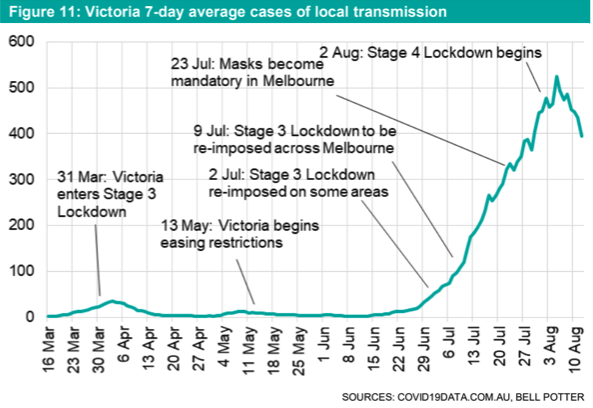Victoria’s coronavirus curve tipped to flatten by September: report

European experiences of dealing with the COVID-19 pandemic give pointers for Australia: Getty Image
Victoria’s second wave of coronavirus cases may have peaked in early August and will likely fall to a weekly average of around 75 cases by mid-September when it emerges from its six weeks of stage-four social restrictions.
This scenario is based on the experience of Western European nations that have implemented various measures to suppress the spread of the coronavirus, investment firm Bell Potter said in a report.
“Irrespective whether a ‘hard style’ i.e. Victoria’s stage three and four measures, or a ‘soft style’ i.e. Victoria’s stage two and three measures, lockdown was chosen, it took an average of about 20 days from when restrictions were first implemented until a peak in virus cases was seen,” the report, written by analyst Steven Anastasiou, said.
But the report calls into question the sustainability of community lockdowns to control the spread of the pandemic in Australia.
“The continued adoption of elimination strategies across Australian states including Victoria and NSW, risks isolation from Victoria, NSW and the world, and at the very least, the continued maintenance of strict two-week quarantine requirements,” Bell Potter says.
Evidence is growing that early case fatality rates seen in Europe and the US are trending lower, and may reflect improved treatment, the isolation of vulnerable groups, and the spread of the virus among younger less at-risk populations.
Herd immunity approach tested in Sweden, US
Sweden and Portugal are the only Western European countries to have seen a decline in their seven-day average caseload of COVID-19 since July 1.
“The curves of these countries show that neither severely suppressed virus spread, but instead flattened the curve and maintained a gradual spread of the virus,” the report said.
Sweden is notable in pursuing a herd immunity approach to the virus and may be vindicated in the long run.
“If herd immunity is found to be more achievable than first anticipated, economies of nations where significant community transmission has taken place i.e. Sweden and the US, may be among the first economies to bounce back and return to normal,” the report said.
Many Western European countries that have practiced a severe suppression strategy such as Spain and the UK are currently experiencing a second wave of virus cases.
Australia stuck in the first of three psychological stages
Bell Potter identifies three distinct psychological stages to the coronavirus pandemic.
Firstly, a fear of the unknown and a desire for severe suppression or elimination techniques.
Secondly, a gradual realisation of economic and social costs of the virus.
And thirdly, a realisation of the inevitable outcome and a drive for normality.
“Australia is largely still in the first phase, supported by its large welfare net and relative lack of community spread, leaving people fearful of the unknown and hopeful of severe suppression or elimination,” Bell Potter said.
But the report notes that Victoria is moving to the second psychological stage as lockdown fatigue grows, and individuals gain a greater understanding of the virus’ relative dangers.

Side-effects of pandemic control response
Containment measures to control the spread of the virus are causing a rise in nationalist sentiment.
“As nations impose lockdowns, and curtail travel, there is likely to be an increase in nationalistic sentiment on a global basis,” Bell Potter said.
But it comes at a price.
“Regions that continue to pursue an elimination strategy i.e. Australia excluding Victoria and NSW, face being isolated from the rest of the world indefinitely, in order to maintain having no cases,” the report said.
There is also the concern that it may become much harder for authorities to impose further lockdowns on communities.
This is because of ‘lockdown fatigue’ and damage to peoples’ mental and physical health and dislocation to economic activity, according to Bell Potter.
“Past pandemics, such as the 1968 Hong Kong ‘flu and 2009 ‘flu virus, continue to remain in circulation today.”
This being the case, herd immunity may be the best long-term strategy to pursue.
“China is currently in the third stage, and has likely been there for some months, as the country fires up its economy and returns to normal,” the report said.
“This will enable it to further cement its status as a world power, as other nations languish under restrictions.”

UNLOCK INSIGHTS
Discover the untold stories of emerging ASX stocks.
Daily news and expert analysis, it's free to subscribe.
By proceeding, you confirm you understand that we handle personal information in accordance with our Privacy Policy.








